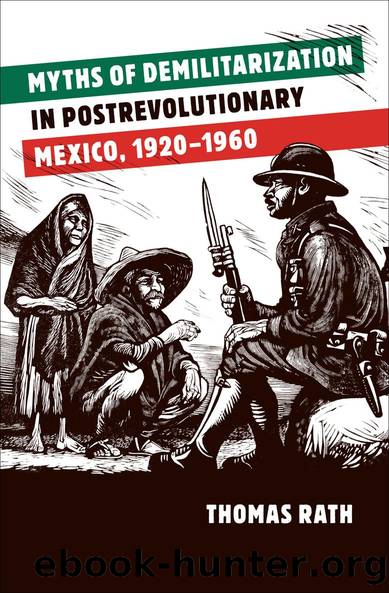Myths of Demilitarization in Postrevolutionary Mexico, 1920-1960 by Thomas Rath

Author:Thomas Rath [Rath, Thomas]
Language: eng
Format: epub
Tags: History, Latin America, Mexico, General
ISBN: 9781469608358
Google: jeGo_k_OIjMC
Publisher: UNC Press Books
Published: 2013-04-22T03:33:35+00:00
Conclusion
As we saw in the previous chapter, the role of Mexicoâs military officers in national politics changed in important ways in the 1940s and 1950s. In contrast, the story of military policing is ultimately one of profound, if contested and controversial, continuities. The Avilacamachistas wrought many changes in Pueblaâs politics and society, but the demilitarization of policing was not one of them. Not all of this police work was viewed as political and illegitimate, but a good deal of it was. In the 1940s and 1950s, the army carried out many of the tasks of policing and collective repression familiar elsewhere (disarmament drives, crowd control, mediating agrarian disputes, raiding recalcitrant ejidos, strikebreaking, harassing and intimidating unionizers, low-level assassinations), along with some particularly brazen Avilacamachista innovations such as the imposition of uniformed officers at the head of town councils and the state university.
It would be easy to exaggerate the effects of protest, which did not curtail military impunity or force the government to stop military policing. Direct public criticism of the army remained risky. However, criticism of army policing was not entirely futile. Protests were more successful when they occasionally exposed divisions within the Avilacamachista group, or when they focused on the most flagrant and legally questionable appointments of officers to civilian posts. Paul Gillingham has recently argued that popular protests under the PRI, while they rarely led to dramatic shifts in policy, could still function subtly and cumulatively âas bank deposits of resistance, reminding politicians and elites of the high operating costs of unpopularity.â146 Protest at Matamoros and the university perhaps fall into this categoryâa modest function, but one that made sense to the people who engaged in it. Throughout the 1960s, left-wing student groups once more demanded university autonomy from the state government and would look back to their earlier successes as a source of inspiration.147
Given the state of contemporary research, it is difficult to assess how typical Pueblaâs experience of army policing was. Puebla probably suffered an unusually high level of militarization, given the Avilacamachistasâ penchant for putting army officers in charge of civilian institutions in a quasi-formal capacity. There is ample evidence that military violence in Veracruz and Guerrero in the 1940s helped to increase the PRIâs control of local politics. However, other state governments were not quite so cavalier in disregarding the institutional boundaries between civilians and the army. In Oaxaca, according to Benjamin Smith, the army was absent from great swathes of the state, hamstrung by daunting terrain and a feeble budget and rendered unnecessary due to powerful local caciques.148 On the other hand, evidence from Michoacán shows that outright militarization of conflictive provincial municipalities occurred elsewhere. In the Huasteca, the government tried to impose order in conflictive municipalities by sending a military officer to take over the police force. However, the frequency and meaning of such episodes are difficult to probe due to the armyâs own secrecy and, not least, local peopleâs apparent reluctance to talk about them.149
The story of military policing in Puebla has larger implications that are important for our understanding of Mexican political development.
Download
This site does not store any files on its server. We only index and link to content provided by other sites. Please contact the content providers to delete copyright contents if any and email us, we'll remove relevant links or contents immediately.
Cat's cradle by Kurt Vonnegut(15334)
Pimp by Iceberg Slim(14488)
4 3 2 1: A Novel by Paul Auster(12375)
Underground: A Human History of the Worlds Beneath Our Feet by Will Hunt(12087)
The Radium Girls by Kate Moore(12018)
Wiseguy by Nicholas Pileggi(5769)
The Fire Next Time by James Baldwin(5431)
Perfect Rhythm by Jae(5398)
American History Stories, Volume III (Yesterday's Classics) by Pratt Mara L(5300)
Paper Towns by Green John(5177)
Pale Blue Dot by Carl Sagan(4996)
A Higher Loyalty: Truth, Lies, and Leadership by James Comey(4954)
The Mayflower and the Pilgrims' New World by Nathaniel Philbrick(4492)
The Doomsday Machine by Daniel Ellsberg(4484)
Killers of the Flower Moon: The Osage Murders and the Birth of the FBI by David Grann(4435)
The Sympathizer by Viet Thanh Nguyen(4384)
Too Much and Not the Mood by Durga Chew-Bose(4337)
The Borden Murders by Sarah Miller(4313)
Sticky Fingers by Joe Hagan(4188)
